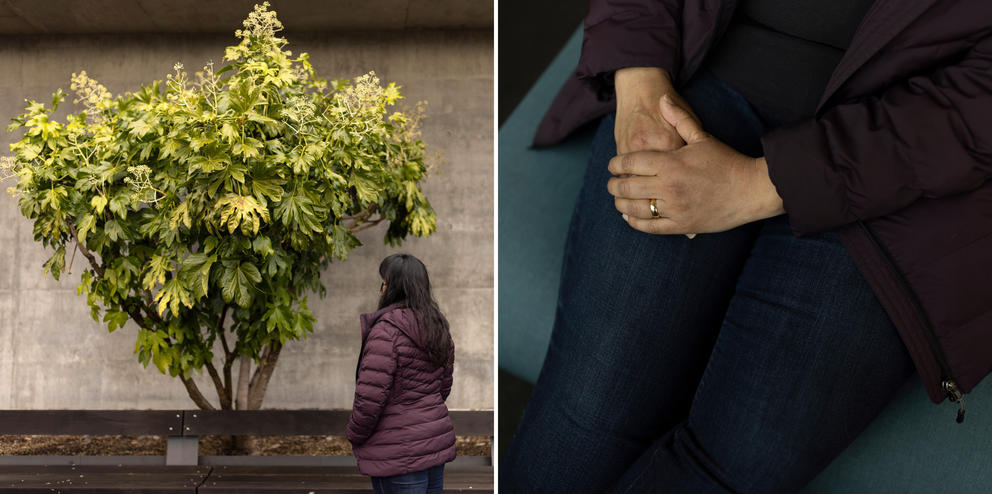Mendoza, who lives in Washington state, asked Crosscut to use her maiden name for her safety. She remarried in the U.S. and gave birth to one child before being detained while pregnant with her second.
“My oldest son was just a baby,” she said. “I remember seeing his first steps when I was in detention.”
She eventually returned to Mexico out of concern for her unborn baby’s health. Mendoza planned to counter a judge’s decision that shot down her quest for asylum, but the slow mailing system prevented her from appealing by the deadline. She returned to the U.S. in the early 2000s, but said she has not been able to adjust her immigration status since.
For undocumented immigrants, stability may have felt within reach even just a few months ago, when congressional lawmakers talked of providing a pathway to citizenship via the Build Back Better bill, President Joe Biden’s economic plan for key areas like climate change and health care. In September, Senate Parliamentarian Elizabeth MacDonough shut down the effort, as well as a subsequent measure that would have qualified millions of people for permanent residency.
The most recent attempt at immigration reform happened in November, which would have impacted undocumented immigrants who came to the U.S. before 2011 and resided in the country continuously since. The House of Representatives passed a version of the bill that would have offered this group work permits and temporary relief from deportation, but MacDonough issued guidance a month later that dismissed this proposal. Some advocates and immigrants, like Mendoza, expressed frustration that the latest provision made people’s futures contingent on a specific timeline, rather than offering guaranteed steps to citizenship.
“It’s like Congress wants to think about divorce before they get married,” Mendoza said.
Mistrust in the government
The most recent attempt to secure immigration reform in the Build Back Better bill may have offered stability to the country’s undocumented population, but the window of time inspired little confidence even for Washington state immigrants who could have benefited.
Every two years, Abril Martinez Rodriguez has to renew her coverage under the Deferred Action for Childhood Arrivals program, which she first applied to in 2016. The program, also known as DACA, was established in 2012 to protect from deportation people brought into the country as children.
She knows a proposal like the latest version in the Build Back Better bill could help someone like her, but the relief would be temporary: The provision offered five-year protections that would be extendable for another five years. She worried about what would happen to immigrants once the protection period ends.
Martinez Rodriguez, who moved from Mexico in 2005 and now considers Washington state her home, works with OneAmerica, an immigrant and refugee advocacy nonprofit based in Seattle. The group has repeatedly stressed the importance of including a pathway to citizenship in Build Back Better. That could impact at least 264,000 undocumented people across the state.
Nearly half of the adults polled by Gallup in January 2019 favored giving undocumented immigrants living in the country a chance to become citizens if they met specific requirements over a period of time. About one-third of respondents strongly favored this option.
The temporary pass offered in the recent Build Back Better proposal bothered Mendoza, who feared that undocumented people could be thrown out by Immigration and Customs Enforcement once their protection lapses.
“People’s information will be on the radar,” she said. “To me it’s just a Band-Aid that will come off and the injury will still be there.”
That trepidation toward the government is not new.
After DACA became available in 2012, some people eligible for the program feared applying because they thought doing so might draw attention to loved ones who are also undocumented, said Jose Ortiz, an immigrant advocate in Washington state. He thinks the same fears could resurface with the most recent Build Back Better provision.
“I think we’re gonna have situations like that where people might lose out because of the mistrust that they have in the government,” Ortiz said.
Left: Dozens of candles and bouquets sit beneath a statue of the Virgin Mary next to the Tri-Parish food bank in Burlington, Skagit County, Dec. 18, 2021. The statue is a popular place for immigrants to pray. Right: Jose Ortiz, an immigrant advocate, moved from Mexico when he was a child and learned he was undocumented only when he started applying for college scholarships. (Grant Hindsley for Crosscut)
A broken system
Some immigrants have lived undocumented for years — sometimes without even realizing it.
Ortiz, 59, moved from Mexico when he was a child and learned he was undocumented only when he started applying for college scholarships. Once he found out, he was able to navigate the immigration system with relative ease because his mom was already a citizen.
“For us it was very simple,” he said. “We didn’t have to struggle or fight it.”
As of 2017, almost one quarter — about 10.5 million people — of the U.S. foreign-born population was undocumented, according to estimates from the Pew Research Center. In another report, the organization found that about two-thirds of undocumented immigrant adults had lived in the U.S. for more than a decade, while half had lived in the country for at least 15.1 years.
The Senate parliamentarian’s most recent rejection of the temporary-protection provision in December drew pushback from the White House, which said in a statement that it would keep fighting for the protection and relief of communities living in fear, including farmworkers and essential workers.
“Ultimately, it’s time for Congress to stop kicking the can down the road and finally provide certainty and stability to these groups, and make other badly needed reforms to our outdated immigration system,” White House representatives said.
Following the rejection, Senate Democratic leaders, including New York’s Chuck Schumer, and Illinois’ Dick Durbin, issued a statement announcing they would continue working to secure a pathway to citizenship in the Build Back Better Act. In Washington state, U.S. Sen. Patty Murray, also a Democrat, responded on Twitter to the most recent rejection.
“Like I've said before, I will do everything I can to create a fair pathway to citizenship and fix our nation's broken immigration system,” she wrote. “This decision does not mean I will stop pushing to get there. Our work continues.”
Stress of being undocumented
Ortiz has seen suffering among those at the mercy of the immigration system. People were taken from their job sites. Some lost loved ones in other countries.
“They can’t go back home to bury their own,” he said.
Immigrants may have already experienced trauma before arriving in the U.S. because of the situations they navigated to get into the country or the circumstances that led them to leave their home countries in the first place , said India Ornelas, an associate professor in the University of Washington’s School of Public Health.
All of that trauma puts them at an increased risk for poor mental health, said Ornelas, who researches how immigrants’ physical and mental health changes once they come to the U.S.
Some circumstances can make adjusting to a new life in the U.S easier, like migrating with loved ones or moving to areas where they receive support from other immigrants, Ornelas said. But sometimes they have been separated from family and have little access to services like health insurance.
Ornelas pointed to several stressors that affect immigrants. These include the inability to work or being limited to low wages because of their immigration status, which can result in food or housing insecurity.
The impact of being undocumented can weigh heavily on younger generations, too, according to Ornelas.
“I think it’s just very hard for them to plan their lives,” she said. “They have lots of ambitions and things they want to do and ways they want to contribute to our society. And a lot of that’s just limited or unknown.”
DACA recipient Martinez Rodriguez’s parents used to be among the more informed people, but as she got older she grew to become more aware of matters related to immigration, she said. The knowledge has come with a price: The more she gets involved, the more depressed and anxious she feels about her situation. Staying out of the loop isn’t always enough to distract her.
“Even the times that I’m not looking at the news, I’m not watching the news, I’m not updated, I still think about it,” she said.
Crosscut interviewed Mendoza, Ortiz and Martinez Rodriguez before the Senate parliamentarian rejected the latest proposal. At the time of her interview, Martinez Rodriguez said she would have been disappointed if the bill went through in its current form.
For her, some movement toward reform might be better than nothing, but a pathway to citizenship would have been life-changing.






